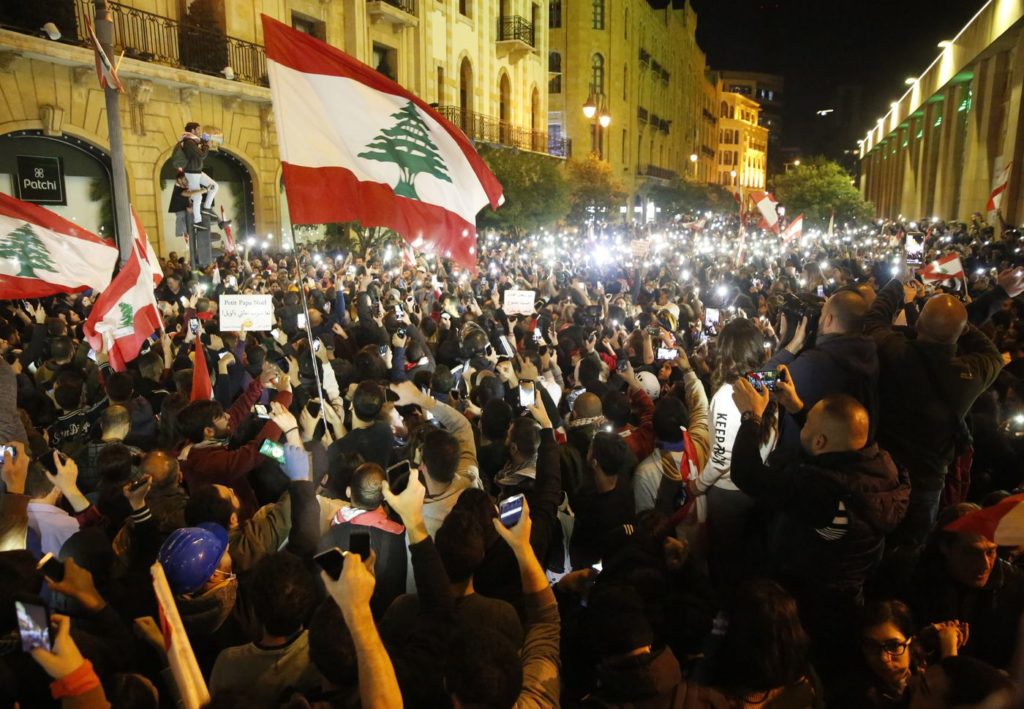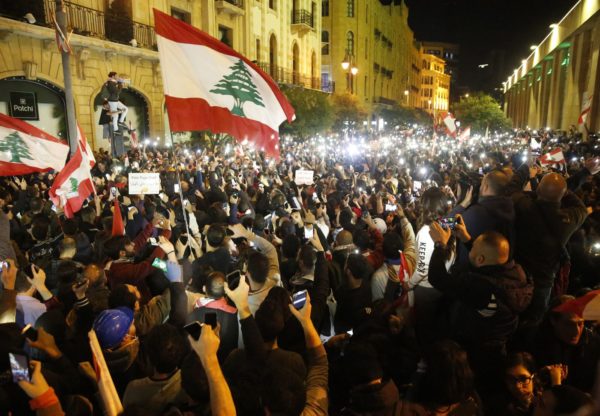Tear gas engulfed central Beirut as security forces chased protesters near Lebanon’s parliament on Sunday in a second night of street clashes that wounded dozens of people.

Protesters had returned despite a fierce crackdown by security forces the night before when clashes also injured dozens.
It marked the most violent unrest in the capital in a historic wave of protests that has swept Lebanon since Oct. 17 and pushed Saad al-Hariri to resign as prime minister.
The protests erupted from anger at a political elite that has overseen decades of corruption and steered the country toward its worst economic crisis since the 1975-1990 civil war.
“We will not leave. They are the ones who looted the country. They are the ones who got us here. We want our rights,” said Nadine Farhat, 31, a lawyer protesting on Sunday
Riot police and security forces, deploying again in large numbers, unleashed water cannons at hundreds of demonstrators who remained on the streets.
The Lebanese Civil Defense said it had treated 46 people for injuries and taken 14 others to hospital.
Lebanese security forces attack in ‘a barbaric way’
The clashes rocked a commercial district of Beirut for hours late into the night, and army soldiers closed off some roads.
Lebanon’s Internal Security Forces said they fired tear gas after demonstrators pelted them with fireworks and stones, injuring some officers. On Twitter, the ISF called on people to leave the streets.
Crowds of men and women ran for cover chanting “revolution, revolution!” as white smoke streaming out of tear gas canisters encircled them. Some hurled the canisters back at riot police standing nearby in body armour.
“They attacked us in a barbaric way, as if we’re not protesting for their sake, their children,” said a protester, Omar Abyad, 25, a nurse who has been unemployed since he graduated two years ago.
Abyad said he rallied on Sunday in part against Hariri’s potential return as prime minister, calling him one of the same faces who have long ruled the country.
Parliamentary consultations on Monday
Lebanon’s main parties have fueded over forming a new government, and Hariri is expected to be named prime minister again at formal consultations on Monday. But political rifts look set to hinder agreement on the next cabinet, which the country badly needs to ward off an even worse crisis.
Foreign donors say they will only help after there is a cabinet in place that can enact reforms.
The UN has insisted on the importance of the talks, with its Lebanon coordinator Jan Kubis urging politicians to “act responsibly”.
“Tomorrow is the moment of truth. Either politicians will show at this critical moment of deep complex crisis they understand the needs of #Lebanon and its people and help steer a peaceful way forward, or that they remain captive of their traditional habits and attitudes,” Kubis tweeted.
Economic woes
Sunday’s demonstration in Beirut began peacefully with protesters waving Lebanese flags and chanting “Hariri will not return”.
“Change needs time and patience and we will not stop until we achieve our goals and remove this regime completely,” said 23-year-old protester Carla.
“We don’t want Hariri because he is a partner in (official) corruption”, she added.
“I am opposed to Hariri returning as head of the government and I don’t understand why they can’t find anyone else,” said Nour, a pharmacist.
“There are many competent people… who are independent,” she added.
The head of the Internal Security Forces, Brigadier Imad Othman, spoke to protesters in Beirut Sunday, urging them to remain peaceful and let security forces carry out their duties unhindered.
The process of forming a government will take place as Lebanon’s debt-burdened economy has been sliding towards collapse.
The country is facing a dollar liquidity crisis, with banks limiting the withdrawal and transfer of the greenback, which has been selling for more than 2,000 Lebanese pounds on the parallel market for the first time since it was officially pegged at 1,507 in 1997.
The international community has urged a new cabinet to be formed swiftly to implement key economic reforms and unlock international aid.
French Foreign Minister Jean-Yves Le Drian on Sunday urged Lebanese leaders to push to resolve the crisis paralysing the country, warning of a “dramatic situation”.
(FRANCE 24 with REUTERS and AFP)


Leave a Reply
You must be logged in to post a comment.